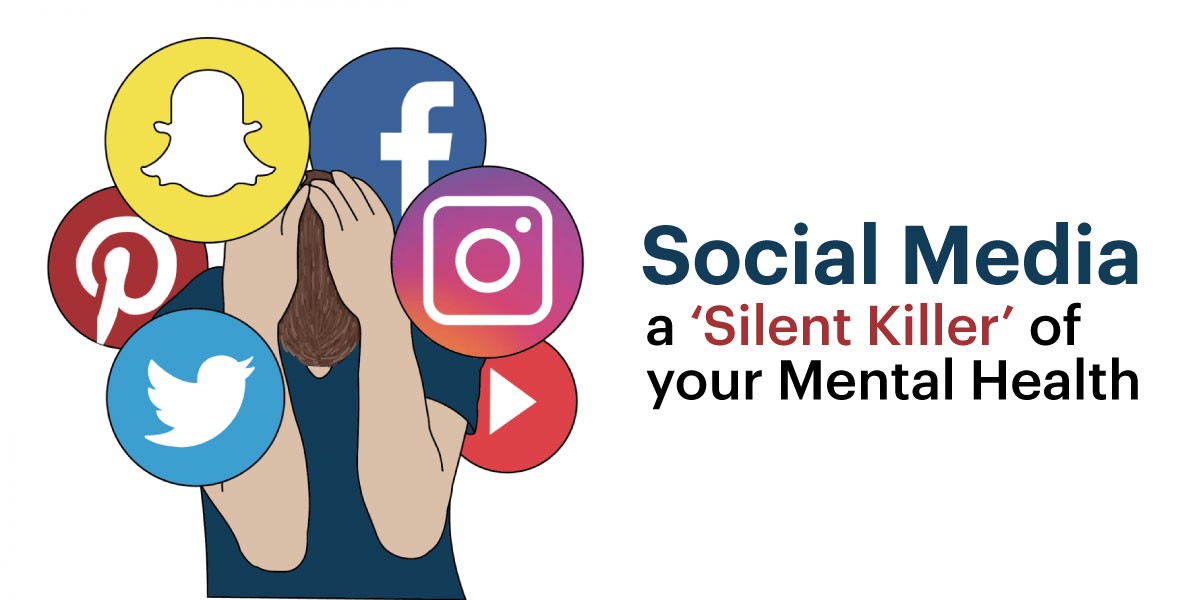Social media sites have brought people together in any ways that weren’t possible just a decade ago. It’s no secret that people love social media. Whether it’s Facebook with over 2 billion active users as of October 2018 or Instagram with its 1 billion users or LinkedIn with its 590 million users, each of these sites offers a unique place to interact with friends, family and sometimes strangers. But the price of that connection is the severe risk to privacy and security as cybercriminals, virus writers and hackers are waiting to take advantage of users’ personal information. A recent study at Harvard University provided evidence of why social media sites are so addictive. With this addictive power, social media has the power to change our lives dramatically, and not always for the better.
A study revealed that people who spend more than three hours a day on social media may be at higher risk of mental health problems, a large study has found. A research one on 6,595 youngsters aged 12 to 15 in the US found that those who used social media more heavily were more likely to report issues such as depression, anxiety, and loneliness, as well as aggression and antisocial behavior than teenagers who did not use social media. Spending hours on sites like Facebook, Twitter and Instagram are having a negative impact on people, raising levels of anxiety and depression as per health experts.
Exposure to Cyberbullies- Disrupting Health
People have been hoodwinked by a social media scams every other day. Cybercriminals might be common, but the techniques that scammers use for cyberbullying can differ. Here are some common social media scams that are drastically impacting the mental health of people:
Fake Account Catfishing
As social interaction online is increasing there comes an increase in relationships that were built through social media. It’s reported that 1 in 5 relationships begins online. According to an estimation by 2040 70% of people will have met their significant other online.
Scammers have taken this as an opportunity to use people who are looking for love. Catfishing is online harassment in which someone creates a fake identity online to start a relationship. Then this relationship and trust are used to scam people out of money. It plays on people’s desire for love and when reality comes forward the person being bullied is devastated and depressed. Keeping in view such scams, no one can deny the importance of identity verification for social media.
Deepfake Deception
Social engineering and fraud are by no means a new threat to everyone. Deepfakes deception is a technology gone bad. This technology is being used to generate fake videos of people for scamming purposes leaving in individual in real trouble. These deepfakes are used for cyberbullying or to demand ransom from the target individual. China makes it a criminal offense to publish deepfakes or fake news without disclosure.
This type of attack is even done by falling facial recognition technology by facial spoofing attack that involves tricking facial recognition software into improperly recognizing an intruder as an authorized user. These presentation attacks are an open security issue and more susceptible to crime than any other biometric trait due to the ease with which faces can be accessed and reproduced.
Account Hijacking
Our accounts on social media say all about our lives so account hacking can cause a lot of trouble for individuals since it has private data and information. The victim falling prey to such cybercriminal falls for mental disturbance and anxiety since all of his data is in the wrong hands. It results in loss of sleep and tension. Just imagine your account being hacked by a cybercriminal and gaining access to your close friends and family. Nobody wants that!
So much time is spent on social media that it’s important to be aware of these potential scams that can cause much damage to our health. The good news is that a lot of these common tricks are recognizable and easy to foil. The bad news is that millions of internet users who are not tech-savvy fall for such scams. They may not be able to identify such plays on their innocence. The way we teach young hikers and scouts to identify poison ivy in the wild, we need to teach social media users how to spot and circumvent these dangers instead of destroying their health in the charm of having in touch with friends and family. Social media is a silent killer because while we enjoy it we lose track of time and indulge many hidden scams that are ultimately dangerous for us.


